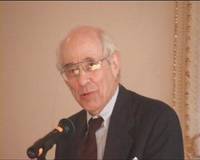
A former student of mine, now finishing his doctorate at the University of Glasgow in Scotland, recently finished reading
Ethics without Ontology by Hilary Putnam (pictured left), a philosopher at Harvard. He emailed me the following quotation from the book and asked me what I thought of it:
"Once people were allowed (or allowed themselves the freedom) to discuss alternative understandings of the Bible, the whole idea that the Bible in any way obviously and clearly mandates that every society must have a king, or if that society does have a king, then that king rules by Divine Right, was seen to be extremely dubious. It is after the Divine Right of Kings has been questioned, that is, when people have already begun to search for alternative conceptions 'about the way to live or the way to order society,' that modern ideas of freedom and reason arise as people begin to formulate the conceptions which will guide them when they live in societies which no longer have absolute monarchs--and, of course, once monarchy came into question, then aristocracy was soon likewise
questioned" (page 127).
After reading this, I couldn't help recollecting a book I read many years ago, still a classic on the subject, which I still consider one of the best book available on this subject generally:
The Revolt of the Masses by the great Spaniard and student of phenomenology (especially Scheler's), Ortega y Gasset. Indeed I do think there is a "domino effect" sort of historical logic or chain reaction, and even that the fall of the "divine right's" concept played a fairly significant role in it (this, in turn, reminds me of Albert Camus' chapter in
The Rebel, about "regicide" (during the English and French revolutions) and its relation to "deicide." Of course the Bible does not, as such, mandate that every society should have a king-- and monarchy in the OT can even be read as a concession of God through Samuel to the temporal desires of the Israelites who didn't find "theocracy" (via God's prophets) sufficient. But the process of beginning to question authority, which I suppose really begins with Lucifer in heaven, followed by the Serpent in the Garden, had many key milestones, one of the chief of which was Luther's "Here I stand!" (on the ground of "reason" and "conscience" = subjective or private interpretation inde-pendent of ecclesial magisterial authority), most certainly.
 A former student of mine, now finishing his doctorate at the University of Glasgow in Scotland, recently finished reading Ethics without Ontology by Hilary Putnam (pictured left), a philosopher at Harvard. He emailed me the following quotation from the book and asked me what I thought of it:
A former student of mine, now finishing his doctorate at the University of Glasgow in Scotland, recently finished reading Ethics without Ontology by Hilary Putnam (pictured left), a philosopher at Harvard. He emailed me the following quotation from the book and asked me what I thought of it:
0 comments:
Post a Comment